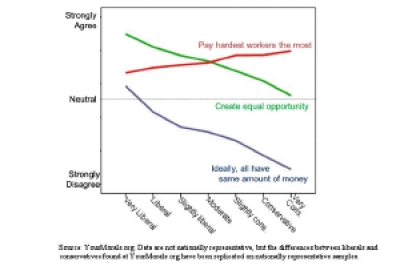MANY THINK the culture war is a battle over social issues such as abortion and same sex marriage. And although these issues are a crucial source of conflict, there is another issue that is less obvious but just as insidious. It is the issue of fairness.
Alexis de Tocqueville (1803-59) toured the United States in the 1830s. His influential book, Democracy in America, was a breakdown of the pros and cons of our new democratic experiment. He was the first to point to the achilles heal of our system. When the citizens of a democracy discover that they can vote financial benefits back to themselves, the gig will be up. Their greed and avarice will bankrupt the governing system.
With this in mind a recent article in Time Magazine titled “Romney, Obama and the New Culture War over Fairness” by Jonathan Haidt is ground breaking. Here is a key quote. “For Obama, the government offers a helping hand, making the American Dream accessible to anyone willing to work for it. For Romney, a good government hangs back and lets people succeed or fail on their own merits.” You can read the entire article here.
The bottom line is this. In my lifetime there has been a tremendous shift. Fairness used to mean an equal opportunity for all that want to succeed. Increasingly it now means an even distribution of wealth amongst all despite effort or lack of effort. This was the very thing de Toqueville feared.
The Bible is about personal responsibility, about a personal accounting each man will give their Maker on the Day of Judgment, about sowing and reaping. Fairness as an equal distribution of wealth is an in-your-face affront to the God who made us. It eviscerates personal responsibility. If the United States continues in this direction the long term affect will be financial ruin. We will vote money back to ourselves in an attempt to promote “fairness,” and in the process bankrupt the Federal Treasury.
Take a few moments to read this article. Then pray for our country.


Thanks for your sermon this week! I am so glad you zoomed out to the big picture of how Christians should relate to civil government. I learned a lot, and I am re-examining some of my own political viewpoints. For example, while I know it's true that people are fundamentally sinful, sometimes I still expect them to act as if they are fundamentally good.Related to that… I agree that putting our ultimate hope in civil government is wrong, but I think that sometimes we fall into the other ditch of putting our hope in the free market/the invisible hand/continuous economic growth. If governments are made up of sinful human beings, then corporations and businesses (big and small) are made up of equally sinful human beings. They are not designed to, and do not claim to work for the good of all people (as government at least purports to do). They are designed to maximize profits for their shareholders only, regardless of social effects and/or environmental devastation. You said that God instituted civil government to restrain evil; I agree, and I think that one of the most important places for that function is in the economic realm. I didn't grow up in the US and so maybe my perspective is unusual, but I find big business to be a lot more scary than big government. 🙂 What do you think?Megan Gardner
Megan. You are right. Sin affects capitalism and business as much as it affects government. However, there is a difference. Capitalism turns our sin to advantage. It uses our desire for material advancement for the benefit of the entire culture. In addition, Capitalism rewards hard work, thrift, and family. Socialism punishes hard work, thrift, and family and instead rewards laziness, extravagance, and immorality. Therefore, we see Capitalism as a way to restrain evil and turn it for good. The book to read is Jay Richards “Money, Greed and God,” Why Capitalism is the solution and not the problem.